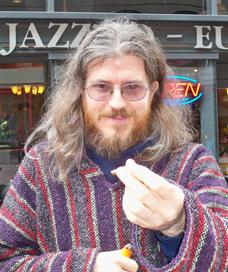Ottawa may appear to be a sleepy town when it comes to marijuana activism, but that’s just because the networks are loose and informal. However, Ottawa’s pot activism will get a very public boost this week with medical marijuana event on Thursday.
Green Therapy, a national medicinal marijuana activist group, is organizing a medical marijuana comedy show under the banner Extravaganja (or, using their preferred capitalization, ExtravaGANJA). The goals are twofold: to give users a nonjudgmental night out and to raise awareness about the cause.
Local comedian and medical marijuana activist Russell Barth, 40, will be partaking in Thursday’s Extravaganja. He has been a licensed marijuana user for nearly 10 years to treat chronic pain from fibromyalgia.
“Cannabis alleviates some of the pain. But it’s not like I smoke a joint and play basketball. It helps me get by,” says Barth.
In 1999, Barth felt he was becoming dangerously addicted to prescription drugs and began researching healthier methods of pain relief.
“Cannabis helps relieve pain. Perhaps it can make some people anxious. But is it mood altering or addictive? No. Clonazepam is addictive and doctors are free to prescribe it for anxiety,” says Barth.
In 2002, he got a medical marijuana licence and quit using pharmaceutical drugs. His wife, Christine, also has a licence. Neither can work because of chronic pain.
“There are several prescription drugs that can, given enough time, make people feel suicidal. All pot does is make people want to sit in front of a television, eat or sleep,” says Barth.
As of June, 2009, there were 4029 Canadians permitted to use medical marijuana under Canada’s medical marijuana regime. Ontario has the highest number of people with pot smoking licences (1631) while British Columbia is in second place (1008). As of this year, 2841 people are allowed to cultivate/produce marijuana for medical purposes and personal use only, and there are 481 designated growers (who grow pot for other people).
The health benefits of pot are no surprise to Ottawa’s queer community. Many HIV/AIDS patients smoke up to combat symptoms like nausea and loss of appetite. AIDS-related health complications are mentioned specifically in Canada’s medical marijuana policy, as are nervous system disorders like multiple sclerosis, epilepsy and spinal chord injury.
Barth says he never bought pot off the streets. He prefers to get his medicine from designated marijuana growers called compassion clubs — networks of federally licensed growers who provide properly cultivated marijuana. He doesn’t trust the quality of pot the black market offers because it usually has mould and pesticides. Nor does he like the government’s supply, which he insists “looks like it should be sprinkled on the floor to soak up puke.”
“[Government-grown medical marijuana] is very poor quality weed. It’s usually old and dried out, full of stems and seeds,” says Barth.
Barth says the medical marijuana community has a strong presence in Ottawa but it is “small and loose-knit.”
“The reason why people don’t hear much about [the medical marijuana community] is because sick people like to be discreet. My wife and I have no career, no kids, ‘nothing to lose’ in that regard, which is why we are so public and vocal,” says Barth.
Mike Foster owns Crosstown Traffic, a local store catering to pot cultivating needs. He is sponsoring Extravaganja. He often hooks up designated marijuana growers with licensed users. He says a lot of his clientele who are licensed medical marijuana are AIDS patients.
“A lot of people living with AIDS come to me because they need to increase their appetite after taking their meds. When people eat well, they are usually healthier and they have a better chance of fighting disease,” says Foster.
But even though growing your own weed and finding compassion clubs can help you get the best quality dope, it’s still an expensive way to medicate. It’s not any less than what you’d pay on the street. The cost for this organic herb is still around seven to 10 dollars per gram, even when bought in quantity. But a good quality supply is worth it, Foster says, because there is virtually no sickness after smoking good pot.
Howard Dover, Toronto native and Extravaganja organizer, says he’s not expecting to generate much money in throwing a show at a smaller venue like Spark St’s Jazoo European Bar & Lounge.
“We’re hoping to throw a show that will allow people to medicate, laugh, and have a good time,” says Dover.

 Why you can trust Xtra
Why you can trust Xtra


